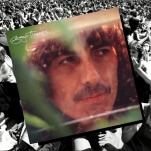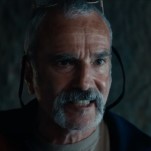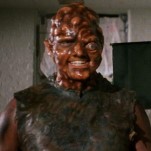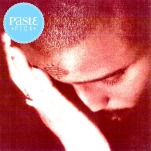John Prine
And daddy won’t you take me back to Muhlenberg County
Down by the Green River where Paradise lay
Well, I’m sorry my son, but you’re too late in asking
Mister Peabody’s coal train has hauled it away
—John Prine, “Paradise” (1971)
It’s not exactly Paradise. In fact, it’s Nashville—if not Hell, then at least Purgatory—where an aspiring songwriter lurks deep within the heart of every waiter, longing to be set free, and where stardom is only a Stetson hat and an open-mic night away. But for John Prine, the gravel-voiced veteran songwriter, it’s home. And these days, almost 35 years after his stunning debut, it’s a home filled with unexpected joys and pleasures.
“My boys are nine and ten now,” Prine says. “And I do what every proud parent does. I go to Little League baseball games. I attend the school functions. And when I tour, I leave on Thursdays and return on Sundays to make sure I can be around during the school week. It’s not the most exciting life. But I wouldn’t trade it for anything in the world.”
The new, domesticated John Prine contrasts sharply with the man who spent his 20s in an alcoholic stupor. Now 59, his hair is short—hardly longer than the crewcut he sported back in his Army days—and it’s shot through with grey. The lines on his face reveal years of hard living. The voice, always a rough and rugged instrument, has been made even coarser by the throat-cancer surgery that derailed him in the late ‘90s. But don’t be deceived. John Prine’s body might’ve been to hell and back, but this is the man who wrote “Please Don’t Bury Me” and bequeathed his stomach to Milwaukee should that city ever run out of beer. He will not go easily or without a fuss, thank God. And he shows no sign of letting up now, although his legacy is already formidable.
It’s been that way for a few decades now. John Prine’s eponymous 1971 debut was a mindblower, a perfectly realized collection of songs from a musician already in his prime, one of the best singer/songwriter releases of all time. The record sounded impossibly wise, irreverently funny and devastatingly sad—sometimes within the same song. “Sam Stone,” “Hello in There” and “Angel from Montgomery” captured the timeless heart of brokenness, loneliness and loss, while “Spanish Pipedream (Blow Up Your TV)” and “Your Flag Decal Won’t Get You Into Heaven Anymore” showcased his wicked sense of humor and razor-sharp wit. It was a hard act to follow.
“I’d like to think I’m still relevant,” Prine says, thinking back on the musical detonation that was his first album. There are no worries on that front. As long as men and women struggle through loveless marriages, and jingoistic patriots still invoke the glory of the flag (hmm, could such a thing happen in 2005?) and old people still grow lonesome and need someone to give them a voice, John Prine will remain relevant.
But the question remains. After you deliver a masterpiece at the ripe old age of 24, what do you do for an encore?
In John Prine’s case, you do just fine. You keep making music, you deliver a few more masterpieces along the way, and you string together a 35-year career with numerous highlights and no real musical low points.
Prine’s 17th album, Fair and Square arrived in late April. It’s the kind of record his fans will instantly recognize and love—raucous, tender, funny, wise and compassionate; the pointed political barbs are tempered by the plain-spoken, aw-shucks demeanor that finds Prine more in the company of Will Rogers than Michael Moore.
“I’m kind of dug in by now,” Prine admits. “I’m not really going for a new sound. But I’d like to think I’m dug in about 20 different ways. I do like to mix it up; electric guitars and mandolins on the same song, Hammond B3 organ and pedal steel, bluegrass and rockabilly tossed in there, torch songs, country songs, a little Irish music, all thrown together.” Fair and Square is the typical eclectic Prine jambalaya, and it features the stellar fiddle playing and harmonies of Alison Krauss and the alt.country sass of Mindy Smith. It’s also the first Prine album produced by John Prine. “It’s a really hard job,” he says. “I wanted to do it, and I’m glad I did it. But I’m also glad Gary [Paczosa, who has engineered albums for Krauss and Smith] was around to help me out.”
There were three releases between 1995’s Lost Dogs and Mixed Blessings—Prine’s last album of newly written original material—and Fair and Square. A live album drew primarily from Prine’s ’90s work, a superb collection of classic country duets featured Prine’s trademark ragged, soulful vocals paired with the likes of Emmylou Harris, Lucinda Williams and Iris Dement, and then Prine re-recorded some of his chestnuts for Souvenirs. Still, nine years is a long time between stretches of new material. What took so long?
-

-

-

-

-

-

-

-

-

-

-

-

-

-

-

-

-

-

-

-

-

-

-

-

-

-

-

-

-

-

-

-

-

-

-

-

-

-

-

-








































